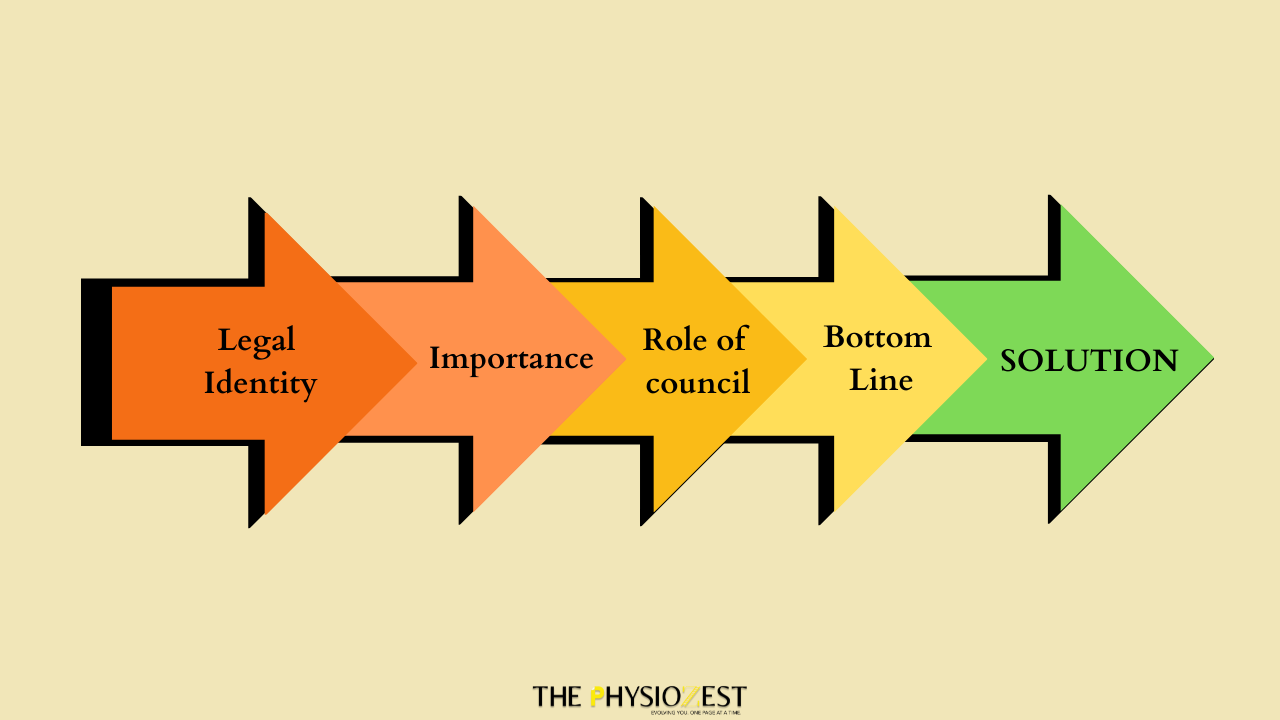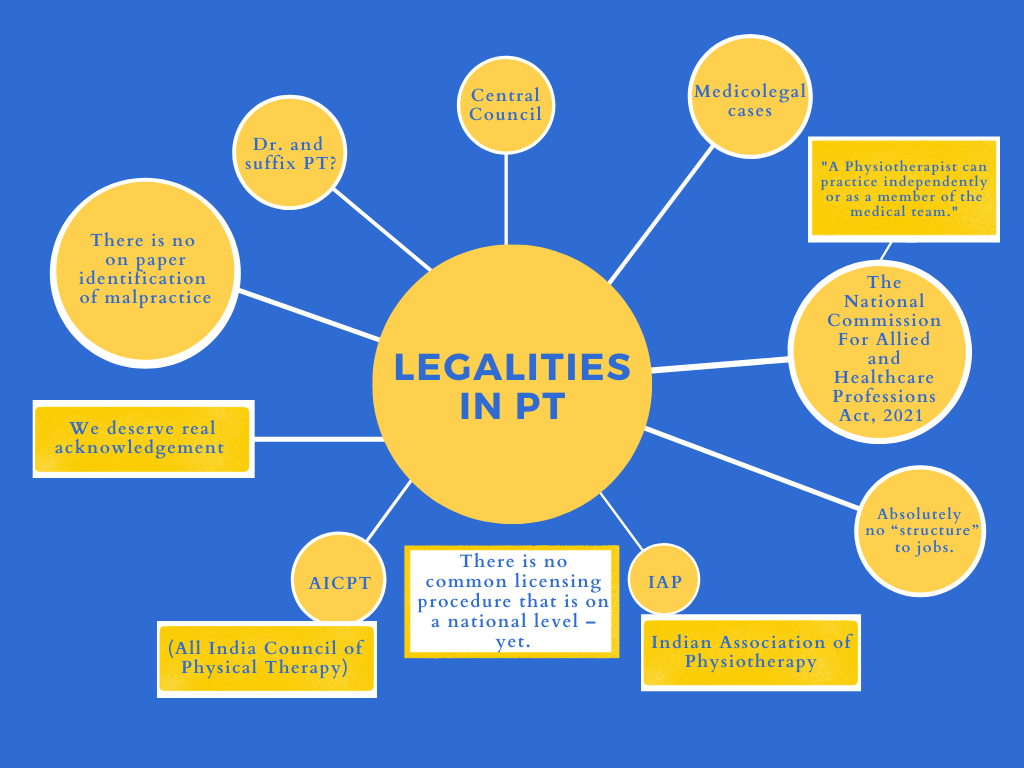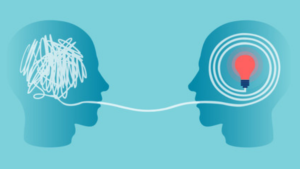
3.5 min read | Leadership
Legalities for a PT in India- Need of the hour
Written by Juwayriah Dalvi, Aishwarya Kale
Graphics by Ria Gorey
Audio by Aparna Premraj, Natasja Azad
Share this article
Peek into:
There is one thing common between us physios – the love for our profession and this very love is the root where all our anger stems from…
Against lack of awareness
Against limited respect
Against malpractices
Against underemployment
And the list goes on.
We all have at least once wondered – who are we? Where do we stand in this country? There are so many questions that most of us do not even have answers for! So many quacks and technicians are practicing in the domain of qualified physiotherapists. So many physiotherapists are indulged in malpractice without the fear of consequences! There is a whole mountain of issues at hand without any solution or a direction towards the solution. To be honest, we hardly know our own definition!

Who are we?
All the Gen Z PTs, update their Instagram bio by adding the prefix Dr. and suffix (PT) as soon as the final year results are declared. How many of us know that there is a huge controversy in our country against PTs using Dr. as a prefix?
The question here is not whether we are doctors. The question here is are we acknowledged as one? I am going to try and answer both of these questions. According to “The National Commission For Allied and Healthcare Professions Act, 2021” a Physiotherapist can practice independently or as a member of the medical team. While this recent Act is a step forward towards the independent practice of physiotherapists in India it is also screaming our reality. This act separates us from the Medical doctors, Dentists, and Ayush Doctors despite us being as integral to the medical team. (Not that any previous Act included us WITH them.)
Although, this act also calls for a Central Council and individual state councils that would determine and ensure the working of all Allied Healthcare Professionals. This puts us along with many other professionals right from OTists, Dieticians to atomic scientists, and technicians. While we and Occupational Therapists remain top tier professions in this Act based on the independent practice clause, the government really does not classify under the category of doctors.
In fact, the National Medical Commission is formerly known as the Medical Council of India, and the Indian Association of Physiotherapists has been in a huge word battle in the past regarding this issue over a court case. [1]
So, does it really matter?
Well, it does. While we exercise our duties in the hospital and clinic setups like any other doctor – no one but ourselves recognizes this work as at par with the doctors. Hence, we are excluded from all the benefits and perks, and government policies for doctors. However, at the same time, we aren’t even under the radar as these medical doctors are. Medicolegal cases against physiotherapists are comparatively very few in number not because they do not really indulge in malpractices but because these malpractices aren’t recognized by the book and often even propagated by various leading names in the field. Whereas the NMC has a written code of conduct and is authorized to take action against doctors failing to follow the code of conduct.
Trust me, it is not a good thing – it is the reason the quality of therapists is unchecked and the growth of the profession is limited. Let alone the compromise in the interest of the patient.
The reason bottoms down to the lack of awareness in the general population or for that matter even the health care professionals as they hardly know the right physical therapy practice to be able to differentiate it with malpractice.
Thus, we lack at both the places – the giving end as well as the receiving end.
Role of Physiotherapy Associations and Councils
The well-known names in the field are AICPT (All India Council of Physical Therapy) and IAP (Indian Association of Physiotherapy). The initiative of both of these organizations in bringing about slow and steady reforms is commendable. However, both these organizations are autonomous and do not have any regulatory powers on the practicing therapists.
Thus, though their initiative helps in bringing many Indian physiotherapists under one roof – their rules and regulations are mere ideal guidelines and are not binding to the practitioners. This stands true for all autonomous bodies registered under the Societies Act, 1860. The members pay a certain fee to be a part of these associations and voluntarily agree to abide by their rules but at the same time are free to withdraw their association with these organizations at any point in time.
Councils, on the other hand, have a more authoritative stance. They are the ones issuing licenses to the practitioners. Thus, their word is binding on the physiotherapists. They are even taking initiatives in eliminating illegal practitioners.
However, in India, all states have different councils of physical therapy which automatically leads to ideological conflicts and it makes it difficult for the therapists to practice in different states as they have to go through with the licensing procedure all over again. There is no common licensing procedure that is on a national level – yet. The proposals are in the parliament. But with the aforementioned, The National Commission For Allied and Healthcare Professions Act, 2021 – what it would mean for our separate councils would be worth knowing. We have not received any concrete answers from the sources and informant authorities in our reach so far.

Also Read: The PZ Comics Issue #1
The bottom line
Our perception of ourselves, the acknowledgment of the state, and the awareness in the population (medicos and non-medicos) regarding our profession are barely on the same page. At this point, the only governance we have is against the quacks in the field. The mistakes and malpractices of qualified practitioners are only being highlighted if there is a physical injury to the patient (electrical burns, breaking of ligaments/prosthesis during treatment). There is no on paper identification of malpractice – corporate hospitals continue to bill patients while they just use electrical modalities without prescribing a single exercise to patients in a physical therapy session and no one would catch hold of them. Because for a fact – it is not listed as a malpractice anywhere.
There is no organization that works on the remuneration and employment schemes of physiotherapists. Thus, we remain underpaid despite putting in at least seven years of detailed learning and clinical practice in undergrad and postgrad. We do not receive any periodic promotions like other corporates. Nor are we compensated more than our previous jobs. There is absolutely no “structure” to jobs.
Most therapists engage in private practice and home calls – which again have zero accountability unless the patient realizes some severe damage and turns to court for compensation. At the same time, there are no written and binding rules for the physiotherapists while working privately, no defined work ethic.
The Solution
Step one of solving any problem is – knowing you have a problem. Right now, we have enlisted our problems. However, the solutions in our country are going to be painstakingly slow to come and the persistence the Gen Z would require to ensure that we reach the solutions is going to be insane. If we do this – it is going to be the toughest thing we do for our profession in our country.
What we really need is a Centralised governing body, Step one of solving any problem is – knowing you have a problem. Right now, we have enlisted our problems. However, the solutions in our country are going to be painstakingly slow to come and the persistence the Gen Z would require to ensure that we reach the solutions is going to be insane. If we do this – it is going to be the toughest thing we do for our profession in our country.
What we really need is a Centralised governing body, recognized by the state that can and does make rules that are binding on the practitioners and their employers and safeguard the rights and duties of the therapist as well as the patient. It is not like no one has thought of this solution and many of our leading figures have already moved ahead to higher authorities to make this happen.
But it hasn’t materialized – yet.
We may now need a fresh start, a fresh approach. Maybe we would have to change how we train our students. Maybe we have to change our domains of practice. Maybe we have to put forth our points differently. The answer isn’t known yet. We have to find it.
If we can’t find it – we have to create it.





